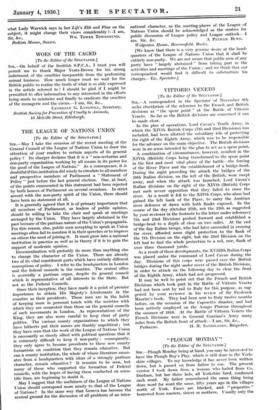VITTORIO VENETO
[To the Editor of the SPECTATOR.] S1R,—A correspondent in the Spectator of November 9th seeks elucidation of the reference to the French and British divisions as "the spear point" at the Battle of Vittorio Veneto. So far as the British divisions are concerned it can be made clear.
In the plan of operations, Lord Cavan's Tenth Army, in which the XIVth British Corps (7th and 23rd Divisions) was included, had been allotted the subsidiary role of protecting the right of the Eighth Army, which was to be responsible for the advance on the main objective. The British divisions were in no sense intended by the plan to act as a spear point.
A combination of circumstances, however, resulted in the XIVth (British) Corps being transformed to the spear point in the first and most vital phase of the battle—the forcing of the River Piave and the establishment of a bridge-head. During the night preceding the attack the bridges of the 58th Italian division, on the left of the British, were swept away, and when the attack was launched, Lord Cavan's Italian divisions on the right of the XIVth (British) Corps met such severe opposition that they failed to cross the river. As a result it fell to the XIVth Corps, who alone had gained the left bank of the Piave, to carry the Austrian river defences at dawn with both flanks exposed. In the course of the day (October 27th, not the 25th as suggested by your reviewer in the footnote to the letter under reference) 7th and 23rd Divisions pushed forward and established a bridge-head to a depth of close on two miles. At the end of the day Italian troops, who had later succeeded in crossing the river, afforded some slight protection to the flank of the 7th Division on the right, but the 23rd Division on the left had to find the whole protection to a red, raw, flank of over three thousand yards.
As a result of these developments, the XVIIfth Italian Corps was placed under the command of Lord Cavan during the day. Divisions of this corps were passed over the British bridges during the night under cover of the British Divisions, in order to attack on the following day to clear the front of the Eighth Army, which had not progressed.
It may be well to point out that the French and British Divisions which took part in the Battle of Vittorio Veneto had not been sent by rail to Italy for this purpose, as sug- gested by your reviewer in his review of Sir Frederick Maurice's book. They had been sent to Italy twelve months before, on the occasion of the Caporetto disaster, and had been actively employed on the Asiago Plateau throughout the summer of 1918. At the Battle of Vittorio Veneto the French Divisions were in General Graziani's Army many miles from the British front of attack.—I am, Sir, &c.,










































 Previous page
Previous page